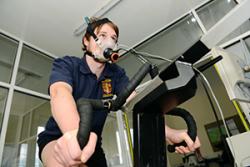There may be more influencing your exercise endurance than you think
Now that we’re in to February, are you struggling to stick to your New Year’s resolution exercise plan? There may be more to your success or failure than meets the eye.
Researchers at Bangor University and the University of Kent have found that being shown positive or negative images subliminally, or so fleetingly that you’re not even aware of having seen them, had an effect on when individuals reached their point of exhaustion while exercising.
 Participants were asked to cycle to a point of exhaustion. In the research using 13 physically active individuals, the researchers found that participants took three minutes longer to reach exhaustion, when subliminally shown happy faces as opposed to sad faces while they were instructed to cycle for as long as possible.
Participants were asked to cycle to a point of exhaustion. In the research using 13 physically active individuals, the researchers found that participants took three minutes longer to reach exhaustion, when subliminally shown happy faces as opposed to sad faces while they were instructed to cycle for as long as possible.
This finding was replicated, but with words replacing the images. The participants again took longer to reach their point of exhaustion when subliminally shown action-related words such as “GO” compared to inactive words such as “STOP”.
This recently published research in Frontiers in Human Neuroscience illustrates the extent to which the mind and psychological factors can effect an individual’s exercise performance.
Commenting on the research carried out at Bangor’s School of Sport, Health & Exercise Sciences, Dr Anthony Blanchfield said:
“These are exciting results. Our findings add to the emerging evidence regarding the mind’s influential role on endurance as well as the research investigating the role of non-conscious cues on behaviour. As far as our study is concerned, one way of understanding these results is that the primes seemingly reduce how effortful the exercise task felt, which in turn meant that the participants could keep going for longer.
“While these are initial findings, one particular implication might be that those who are struggling to stick to that New Year exercise plan may be wise to surround themselves with happy people and action orientated words in order to reap the health benefits of exercise.”
“What’s even more interesting from our study was that people did not even need to be consciously aware of these influences for them to have an effect.”
Co- author James Hardy, of Bangor University commented: “Traditionally scientists have not fully recognised the potential for the mind to play in extending or undermining endurance performance. These two studies form part of a PhD on this issue, one which places an eye on the role of effort in peoples’ disengagement from exercise.”
“The next challenge is to understand the why these findings occur. We want to determine whether the happy images and action words actually lead to an improvement or whether the sad images and inaction words were responsible for undermining performance. At the moment, we only know that there’s a difference between these two primes and not which is “driving” the result; knowing this might allow us to intervene in a more targeted manner.”
Publication date: 6 February 2015
